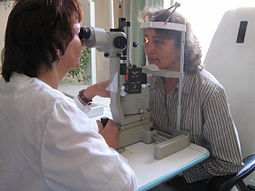
Back تصحيح البصر Arabic Оптометрия Bulgarian Optometria Catalan Optometrie Czech Optometrie German Optometría Spanish بیناییسنجی Persian Optometria Finnish Optométrie French Radharcmheastóireacht Irish
 Eye examination with the aid of a slit lamp | |
| System | Eye |
|---|---|
| Significant diseases | Blurred vision, cataract, macular degeneration, glaucoma, refractive error, retinal disorders, diabetic retinopathy |
| Significant tests | Visual field test, ophthalmoscopy |
| Occupation | |
|---|---|
| Names | Doctor of Optometry, Optometrist |
Occupation type | Health Profession |
Activity sectors | Healthcare |
| Description | |
| Competencies | refractive error, ocular disease, medical therapeutics, binocular vision, sports vision, vision therapy, contact lenses |
Education required | Doctor of Optometry / Master of Optometry / Bachelor of Optometry |
Fields of employment | Hospital, Clinic, Laboratory |
Optometry is a specialized health care profession that involves examining the eyes and related structures for defects or abnormalities. Optometrists are health care professionals who typically provide comprehensive eye care.
In the United States of America and Canada, optometrists are those that hold a 4-year Doctor of Optometry degree, which is earned following their undergraduate college training. They are trained and licensed to practice medicine for eye related conditions, in addition to providing refractive (optical) eye care. Within their scope of practice, optometrists are considered physicians and bill medical insurance(s) (example: Medicare) accordingly.
In the United Kingdom, optometrists may also provide medical care (e.g. prescribe medications and perform various surgeries) for eye-related conditions in addition to providing refractive care. The Doctor of Optometry degree is rarer in the UK.
Many optometrists participate in academic research for eye-related conditions and diseases. In addition to prescribing glasses and contact lenses for vision related deficiencies, optometrists are trained in monitoring and treating ocular disease-pathologies.
In the United States, newly graduating optometrists are all trained in minor surgical procedures and various laser treatments, including peripheral iridotomies, trabeculoplasties, and capsulotomies.
The range of training for optometrists varies greatly between countries. Some countries only require certificate training while others require a doctoral degree.
In the United States, optometrists typically hold a four-year college degree, a four-year Doctor of Optometry degree, and have the option to complete a 1-year residency program.
By comparison, in the United States, ophthalmologists are medical doctors (MDs and DOs) who typically hold a four-year college degree, a four-year medical degree, and additional years of training after medical school in an ophthalmology residency (typically 3 or 4 years) during which they receive training in ocular surgeries.